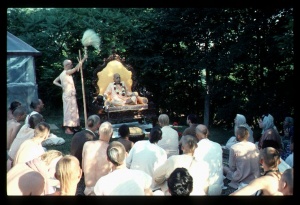CC Madhya 24.180 (1975): Difference between revisions
(Vanibot #0027: CCMirror - Mirror CC's 1996 edition to form a basis for 1975) |
(Vanibot #0020: VersionCompareLinker - added a link to the Version Compare feature) |
||
| Line 2: | Line 2: | ||
<div style="float:left">'''[[Sri Caitanya-caritamrta (1975)|Śrī Caitanya-caritāmṛta (1975)]] - [[CC Madhya (1975)|Madhya-līlā]] - [[CC Madhya 24 (1975)|Chapter 24: The Sixty-One Explanations of the Atmārāma Verse]]'''</div> | <div style="float:left">'''[[Sri Caitanya-caritamrta (1975)|Śrī Caitanya-caritāmṛta (1975)]] - [[CC Madhya (1975)|Madhya-līlā]] - [[CC Madhya 24 (1975)|Chapter 24: The Sixty-One Explanations of the Atmārāma Verse]]'''</div> | ||
<div style="float:right">[[File:Go-previous.png|link=CC Madhya 24.179 (1975)|Madhya-līlā 24.179]] '''[[CC Madhya 24.179 (1975)|Madhya-līlā 24.179]] - [[CC Madhya 24.181 (1975)|Madhya-līlā 24.181]]''' [[File:Go-next.png|link=CC Madhya 24.181 (1975)|Madhya-līlā 24.181]]</div> | <div style="float:right">[[File:Go-previous.png|link=CC Madhya 24.179 (1975)|Madhya-līlā 24.179]] '''[[CC Madhya 24.179 (1975)|Madhya-līlā 24.179]] - [[CC Madhya 24.181 (1975)|Madhya-līlā 24.181]]''' [[File:Go-next.png|link=CC Madhya 24.181 (1975)|Madhya-līlā 24.181]]</div> | ||
{{CompareVersions|CC|Madhya 24.180|CC 1975|CC 1996}} | |||
{{RandomImage}} | {{RandomImage}} | ||
==== TEXT 180 ==== | ==== TEXT 180 ==== | ||
<div class="verse"> | <div class="verse"> | ||
:kiṁvā | :kiṁvā'dhṛti'-śabde nija-pūrṇatādi-jñāna kaya | ||
:duḥkhābhāve uttama-prāptye mahā-pūrṇa haya | :duḥkhābhāve uttama-prāptye mahā-pūrṇa haya | ||
</div> | </div> | ||
| Line 18: | Line 17: | ||
<div class="synonyms"> | <div class="synonyms"> | ||
kiṁvā—or; | kiṁvā—or; dhṛti—dhṛti; śabde—by this word; nija—own; pūrṇatā-ādi—perfection and so on; jñāna—knowledge; kaya—says; duḥkha-abhāve—in the absence of all material miseries; uttama—the best; prāptye—by obtaining; mahā-pūrṇa haya—becomes perfectly perfect. | ||
</div> | </div> | ||
| Line 25: | Line 24: | ||
<div class="translation"> | <div class="translation"> | ||
"The word dhṛti is also used when one is fully perfect in knowledge. When due to having obtained the lotus feet of the Supreme Personality of Godhead, he has no material miseries, he attains mahā-pūrṇa, the highest level of perfection. | |||
</div> | </div> | ||
Latest revision as of 15:16, 27 January 2020
Śrī Caitanya-caritāmṛta (1975) - Madhya-līlā - Chapter 24: The Sixty-One Explanations of the Atmārāma Verse

His Divine Grace
A.C. Bhaktivedanta Swami Prabhupada
A.C. Bhaktivedanta Swami Prabhupada
TEXT 180
- kiṁvā'dhṛti'-śabde nija-pūrṇatādi-jñāna kaya
- duḥkhābhāve uttama-prāptye mahā-pūrṇa haya
SYNONYMS
kiṁvā—or; dhṛti—dhṛti; śabde—by this word; nija—own; pūrṇatā-ādi—perfection and so on; jñāna—knowledge; kaya—says; duḥkha-abhāve—in the absence of all material miseries; uttama—the best; prāptye—by obtaining; mahā-pūrṇa haya—becomes perfectly perfect.
TRANSLATION
"The word dhṛti is also used when one is fully perfect in knowledge. When due to having obtained the lotus feet of the Supreme Personality of Godhead, he has no material miseries, he attains mahā-pūrṇa, the highest level of perfection.